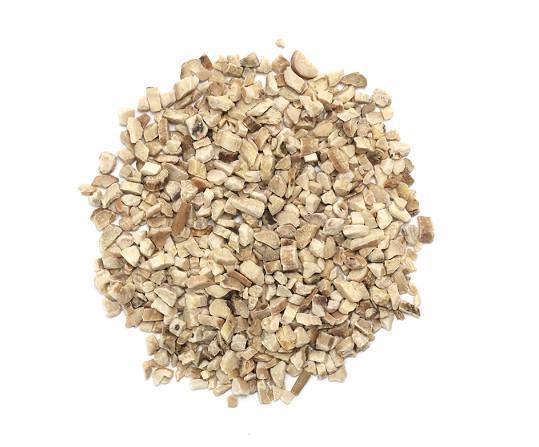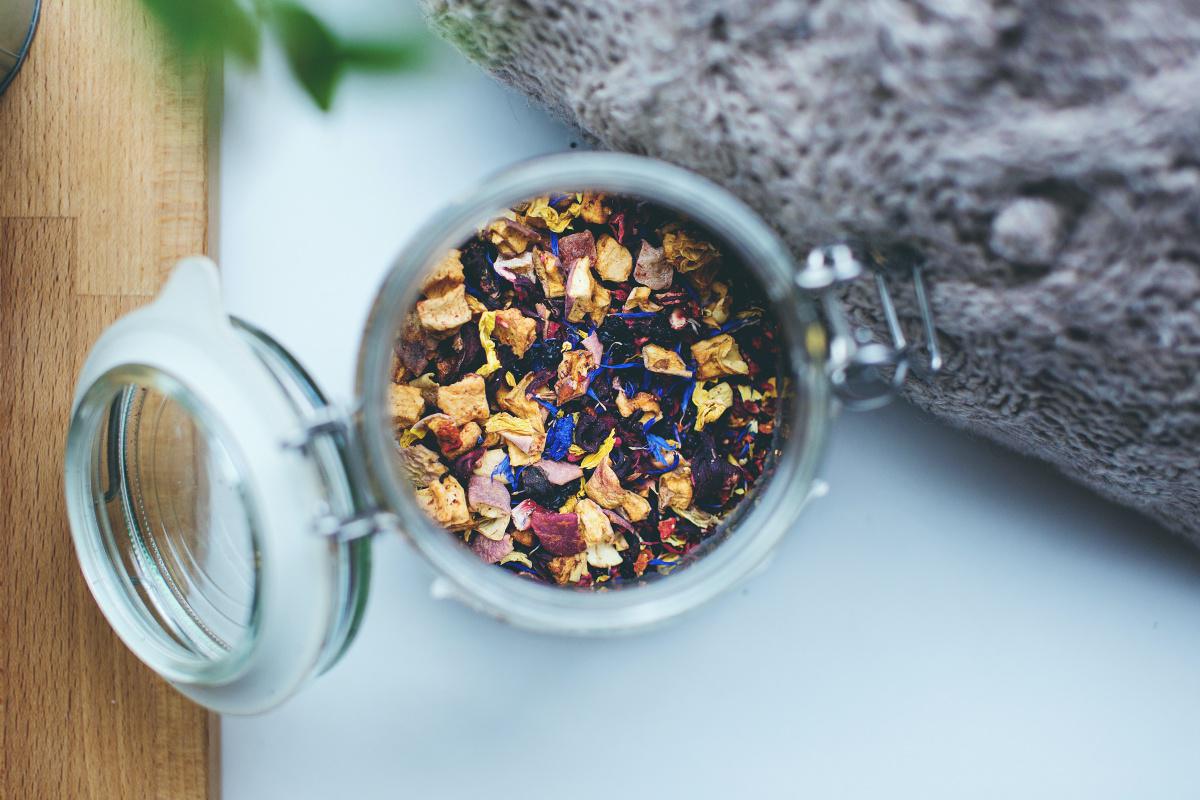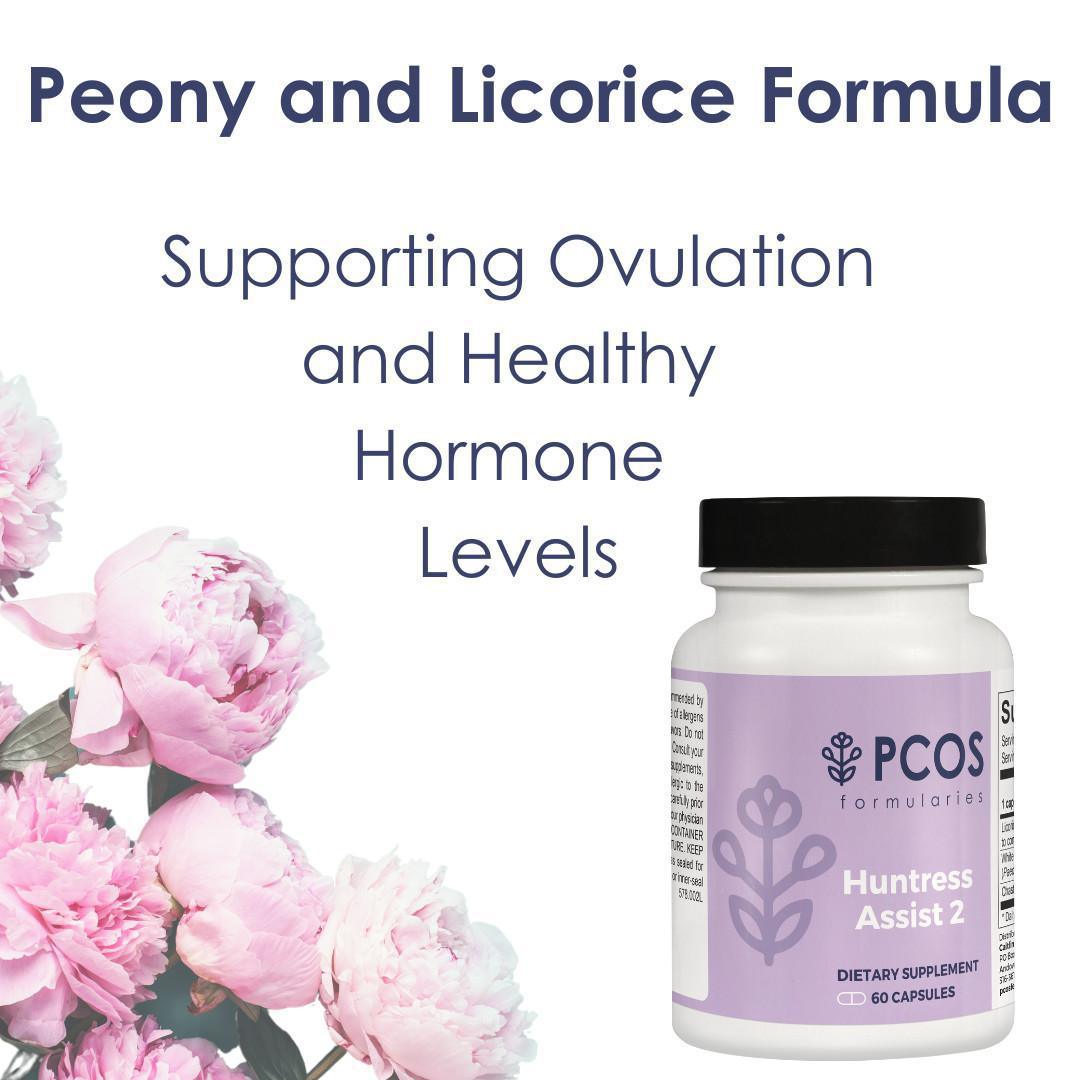Peony (Paeonia) - Chinese peony is an herbal remedy that has been used for thousands of years in women's hormonal management. It has been used most popularly in Chinese medicine and more recently has gained popularity for its use in managing Polycystic Ovary Syndrome (PCOS).
You will usually see it used alongside licorice. The combination of licorice and peony has been used in traditional medicine, particularly in traditional Chinese medicine. As such we don't have a lot of data on the use of peony alone.
Like many traditional therapies, there aren't large amounts of thorough research on its use, and more specifically in PCOS. Unlike the oral contraceptive pill, Peony doesn't have a lot of drug companies lining up to fund studies to see all of its benefits in the female health world.
Many look to this herb for hormone balance and ovulation support. It helps with very foundational imbalances in polycystic ovaries. The ability to support the aromatase enzyme that helps convert testosterone into estradiol (an estrogen), and its ability to lower total testosterone production, increase progesterone, and an ability to lower prolactin make it a really powerful treatment modality for women with Polycystic Ovarian Syndrome. (1)
What is Peony?
Paeonia lactiflora is a perennial blooming plant. That just means it has roots and underground parts of the plant that survive winters while the annual plant growth dies. It's a plant native to central and eastern Asia. You have likely seen it in gardens or even wedding bouquets as they are incredibly beautiful and romantic looking. They also have a rich floral scent.
This native Asian plant has not only been used in traditional Chinese medicine but has been used as an herbal medicine in the Tibetan and Siberian peoples for centuries.
It gains its name from Paeon the Greek physician of the gods. It has properties that many cultures have regarded as bringing good fortune and is as a symbol of prosperity.
What part of the plant is used for PCOS treatment?
While peony flowers are beautiful, it's those nutrient-rich roots that survive annually that provide many of the medicinal properties of this plant.
Paeoniflorin, a component of white peony root, has been shown in studies to decrease testosterone synthesis in the ovaries without affecting negatively impacting estrogen synthesis. (2) This is important because we need estrogen to be made in order to ovulate. Similarly, we need testosterone levels to decrease to allow for regular ovulation in PCOS ovaries.
Peony Root Benefits for PCOS: What do the studies show?
Like many herbal remedies, the research is weak and leaves a lot to be investigated. Much of this has to do with the way scientific studies are performed and funded. There isn't a large community of donors diverting funds away from medicines to look at traditional herbal remedies.
The studies mentioned below have small sample sizes and thus leave questions on the success of implementing peony as a treatment modality. It is also almost exclusively studied in the presence of licorice. So it can be hard to associate its individual benefits outside of what licorice root might provide.
One thing is for certain though, with a high safety profile, limited side effects, and inexpensive nature of this herb, it is my opinion it is worth trialing and seeing how it affects your cycles, especially if you aren't ovulating, ovulating infrequently or are struggling to make enough progesterone.
In Vitro Studies of Peony
An in vitro study just means that it is studied outside of the context of a whole being. You could think of it as a study in. a Petri dish instead of in an animal or human.
A study using the ovary cells of a rat provided the active component of peony root AND licorice root. In this study, the production of hormones varied between the cells exposed to peony and licorice versus the controls that were not.
Ovary cells exposed to licorice and peony saw a significant decrease in testosterone. They also saw an increase in the conversion of testosterone to estrogen. The combination of this effect shows great promise for specific hormonal abnormalities in PCOS ovaries.
In Vivo Studies of Peony
An in vivo study means it's studied in the context of a whole human or animal. These are typically more respected as we can see not just what it does in one type of tissue or organ, but system-wide changes.
In a study conducted back in the 1990s, there was a group of 34 Japanese women with PCOS who were given 7.5 grams of a combination Peony and Licorice daily for 24 weeks (about 6 months). Over this time there was a significant reduction in overall testosterone and free testosterone. This is very powerful for symptom improvement and ovulation. They also noted that over time the LH and FSH ratio was also decreased. (2)
Improving total testosterone, free testosterone levels and improving the ratio of luteinizing hormone and follicle-stimulating hormone has incredible potential to help with egg quality, ovulation, and pregnancy outcomes.
In one trial involving eight women with high levels of androgens and irregular cycles a formula containing peony and licorice was given for 2 to 8 weeks. This combination regulated the LH to FSH ratio. Over this period of time, serum testosterone levels decreased to less than 50 ng/dL and this resulted in seven of the eight women ovulating regularly.(3)
A study involving 20 women diagnosed with PCOS utilized a peony/licorice formula and 90% of patients saw a decrease in testosterone levels and 25% went on to conceive. (4)
While the above trials are small in patient size they do show incredible promise in utilizing these herbal medicines to help achieve ovulation and symptom improvement.
Hormonal Regulation with Peony for PCOS
It's no secret that women with Polycystic ovarian syndrome suffer from hormone imbalances. For many years this condition has been treated like a gynecologic issue. I'd argue this is still very much the case since most doctors hand you hormonal contraceptives(ie birth control pills) and send you out the door.
Polycystic ovarian syndrome is complex. It has metabolic components, true endocrine components, and gynecologic components. Many of the frustrating symptoms associated with this condition are things that impact our reproductive health.
Much of the interplay that women with PCOS struggle with has an element related to insulin resistance. Yet, that has a direct effect on the ovary. Impacting much of the hormone production and thereby contributing to hormonal imbalances.
Insulin, the Ovary, and Hormone Production
Many women with PCOS struggle with insulin resistance. The ovary doesn't become insulin resistant and has something you could describe as an overreaction to insulin. As the body makes more and more insulin for all the rest of the body's tissues struggling to get energy in, the ovary is talking to all that insulin and responding.
Normally the ovary takes that message, takes in energy (blood sugar), and happily makes a balanced amount of estrogen and testosterone. In a PCOS ovary, the testosterone production is MUCH STRONGER. There is also a decrease in the aromatase enzyme that turns testosterone into estrogen.
Too much insulin ends up yielding too much testosterone and not enough estrogen. This is bad news for follicle development. It also jumbles up the message that is supposed to go back to the pituitary in the brain to help determine when to mature follicles and when to release them for ovulation.
It's like when you played telephone as a kid, but there was always someone in the group who changed the message on purpose. Insulin is that silly kid looking for a awkward message at the end. Not what we want when we are trying to ovulate and get pregnant though.
That's what happens in the PCOS ovary. Now, you may read this and say, I don't have insulin resistance. Well, I've been treating women with PCOS for so long I have noticed even those who do not have outright insulin resistance still struggle with this message. This has led me to believe there are individuals who for various reasons, potentially genetic in nature, have ovaries that are extra sensitive to insulin even when the body isn't overproducing it.
When the ovary heads into this testosterone-producing mode the pituitary in the brain struggles to make the appropriate amount of luteinizing and follicle-stimulating hormones. Imbalances in luteinizing hormone compared with follicle-stimulating hormone will literally stop ovulation. Game over.
Not really game over. Things can improve. This is where peony root comes in.
Peony contains compounds that have hormone-balancing effects. In some of the studies listed above we have seen peony act in the following ways:
-
lowering androgen production (specifically testosterone)
-
Increasing the conversion of testosterone into estrogen
-
Lowering overall LH numbers
-
Improving LH to FSH ratios
These are very promising modes of supporting the ovary in a woman with PCOS and correcting hormone imbalances, improving menstrual regularity, ovulation, pregnancy rates, and symptom improvement.
Insulin Sensitivity and Peony Root
Some studies suggest that peony root may improve insulin sensitivity and glucose metabolism. This could be particularly beneficial for women with PCOS who so often have insulin resistance.
The research points to supporting the cell's ability to improve glucose uptake. This would lower insulin resistance and have downstream effects metabolically and hormonally.
Those seeking to ovulate and get pregnant may see particular help with peony since it can improve insulin sensitivity and promote ovulation.
Regulating Prolactin Levels in PCOS is Difficult
We have seen above how lowering androgen levels, improving the LH:FSH ratios have shown in studies to improve ovulation and even pregnancy rates.
Another common hormonal imbalance is women with elevated levels of prolactin. High prolactin levels can be a sign of something other than PCOS. When those other conditions have been ruled out, I find patients are left with few treatment options to try and support regular menstrual cycles or ovulation when prolactin levels are high.
Typically a doctor will prescribe a medication called cabergoline or bromocriptine. For those that want natural solutions, you basically have two options: Vitex or Peony.
If you have high prolactin levels and struggle with ovulating with PCOS. Consider the Huntress Assist 2 product in the PCOS formularies line. It has both vitex and peony in it to provide a comprehensive approach to helping you ovulate, lower prolactin levels, and increase progesterone levels.
Peony can help lower inflammation and increase antioxidant activity in the body
Chronic inflammation is thought to contribute to the development and progression of PCOS evidenced by several studies reporting women with PCOS with high markers of inflammation compared to women without PCOS.
These markers can include elevated levels of pro-inflammatory molecules: cytokines, C-reactive protein (CRP), and other inflammatory markers. Women with PCOS also have higher levels of oxidative stress, which is closely related to inflammation.
Peony contains compounds with anti-inflammatory properties that help mitigate inflammation in the body. These compounds include flavonoids, tannins, and glycosides.
There are compounds used in an immune response in the body called cytokines. Peony has been shown to improve cellular communication helping to regulate the intensity of the inflammatory immune response with cytokines.
Peony also contains antioxidants that counteract oxidative stress and damage. Interestingly peony has also been shown to help protect the gut lining and may help reduce inflammation in the digestive tract.
Fertility Support with Peony Root
If you do not ovulate you cannot get pregnant "in the wild". That's my not-so-fancy way of saying, at home. Ovulation is difficult for women with PCOS. High testosterone levels negatively impact ovarian function.
While we have medicines that can help promote ovulation and doctors are quick to trial these in women with PCOS, we also have traditional medicine that has been used for thousands of years and has been shown to be very effective. Peony is at the heart of traditional hormone support.
In the studies we looked at above the combination of peony and licorice helped not only induce ovulation but also support conception.
Hormonal balance is key to successful conception and lowering risks in pregnancy and while I would love to see more randomized controlled trials that put ovulation induction medications like letrozole up against peony/licorice - in the meantime I'm happy to report I've seen it support many hundreds of women to conceive from my practice alone.
Stress Reduction in PCOS with the use of Peony
Like licorice, peony is also considered to have some adaptogenic properties, which means it may help the body manage stress and maintain balance. It also has some beneficial support for liver detoxification processes which can make it a great option in preconception to help improve detox pathways prior to pregnancy.
As stress isn't just mental stress, but is also something that our bodies struggle with, improving detox pathways, improving insulin signaling, and improving hormonal balance, we can see how peony can be so helpful for overall health improvement and reduction of stress on the body.
Dosage and Duration:
I generally recommend using peony and licorice for 3-4 weeks and then stopping for a week. Cycling on and off of it in that fashion.
Within 6 months of using peony and licorice, you should see the benefits it will provide. After 6 months I will generally have clients switch to other anti-androgenic herbs so as to not build a tolerance for these herbs and have them lose their effectiveness.
Dosage can vary based on whether the plant is being used in a tea, tincture, or as a dried herb. Follow the instructions on the package when choosing a peony product.
I typically recommend taking anything that works directly on pituitary signaling early in the morning. Herbal supplements I recommend that fall in this category are peony, licorice and vitex.
If you are looking to start taking peony, we have a blend in the PCOS Formularies line where we have combined peony, licorice, and vitex to help women ovulate and conceive with PCOS. The product is called: Huntress Assist 2.
Interactions and Side Effects:
While peony doesn't have a long list of side effects it can slow blood clotting so if you have a bleeding disorder this is not the herbal medication for you.
Some have also reported diarrhea with its use, but this is not very common.
It is also often used in combination with licorice. Licorice does have a known side effect of increasing blood pressure, so this isn't recommended for those with high blood pressure levels.
It should not be taken during pregnancy or breastfeeding. However, I do often recommend it to help women begin ovulating and it can be taken up until a positive pregnancy diagnosis.
Before incorporating Peony or any herbal supplement into your PCOS management plan, it's recommended to consult a qualified healthcare provider who can assess your individual circumstances, provide guidance on potential interactions, and help you make informed decisions about whether peony is a suitable option for you. They can provide personalized recommendations based on your health history and current health status.
References
1 Hormone Intelligence Dr. Aviva Romm Page 276
2 https://pubmed.ncbi.nlm.nih.gov/8012442/










